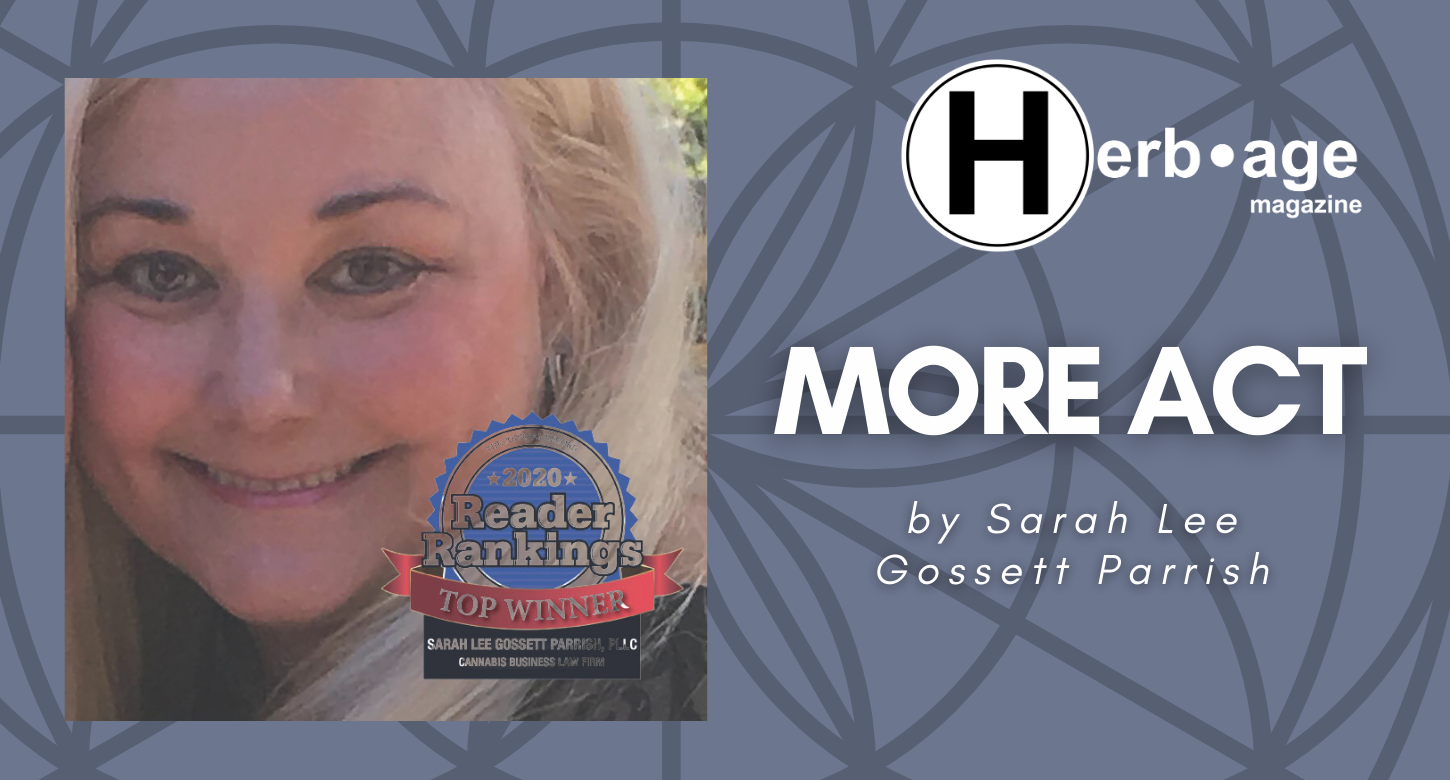WILL THE MORE ACT LEGALIZE MARIJUANA ACROSS THE COUNTRY?
by Sarah Lee Gossett Parrish, Cannabis Lawyer
One of the questions I often am asked is whether, or when, Congress will legalize marijuana. Federal legislation has been introduced to accomplish this—either for medicinal purposes (CARERS Act of 2019) or for whatever purposes each particular state has legalized marijuana (STATES Act). The MORE Act decriminalizes marijuana and recognizes the rights of states to enact their own laws concerning it.
Significantly, the MORE Act is set for a floor vote in the United States House of Representatives the first week in December 2020, somewhere between Wednesday, December 2 and Friday, December 4, 2020. This upcoming floor vote is historic because it is the first ever Congressional roll call concerning a bill that would end federal marijuana criminalization, and by the time you read this, that vote likely will have occurred.
What is the MORE Act?
The Marijuana Opportunity Reinvestment and Expungement Act (“MORE Act”) would remove marijuana from the federal Controlled Substances Act of 1970. Currently marijuana, like heroin, is listed as a Schedule I controlled substance under that Act.
Decriminalization vs. Legalization

The MORE Act would decriminalize marijuana at the federal level. However, decriminalization is not the same as legalization. Decriminalization is the removal of criminal penalties, whereas legalization is the removal all penalties.
However, the MORE Act would also recognize each state’s law concerning marijuana, thereby permitting states to enact their own regulation policies so that marijuana would continue to remain illegal in some states while legal in others. If the Act passes, then those states which have legalize marijuana for medical or adult (recreational) use, including Oklahoma’s medical system, would no longer have to live under the threat of federal interference with their marijuana laws or federal prosecution for the use, possession, or distribution of marijuana.
Assistance for Victims of The War on Drugs
Notably, the MORE Act would expunge and seal previous nonviolent federal marijuana-related arrests and convictions for those not currently serving their sentences. Those currently serving sentences for federal marijuana arrests and/or convictions would have the opportunity for a review of their sentences, with the potential to have their records expunged and their sentences vacated. As such, this aspect of the MORE Act represents a welcome reprieve for those adversely impacted by the war on drugs.

by Sarah Lee Gossett Parrish
Additional provisions include the establishment of an Office of Cannabis Justice within the Department of Justice. This Office would be responsible for administering grants to aid communities negatively affected by the war on drugs, including an “Opportunity Trust Fund” and a “Community Reinvestment Grant Program”. The Act would prohibit the denial of any federal public benefits, like housing, on the basis of marijuana use, and prohibit any adverse impact under federal immigration laws for those who use or possess marijuana. The MORE Act would also impose a five percent commercial sales tax on marijuana, the proceeds of which would be designated, at least in principle, to assist those adversely impacted by the war on drugs.
Paul Armentano, Deputy Director of NORML, stated back in August 2020, when House lawmakers were originally preparing for a September floor vote on the MORE Act, that “Passage of the MORE Act is essential in order to truly right the wrongs of federal marijuana criminalization, and to once and for all allow the majority of states that have legalized cannabis for either medical or adult-use to embrace these policies free from the threat of undue federal prosecution or interference.”
Will we see federal policy change by 2021?
Stay tuned.
Information contained herein provides general information related to the law and does not provide legal advice. It is recommended that readers consult their personal lawyer if they want legal advice. No attorney-client or confidential relationship exists or is formed between you and Ms. Parrish as a result of this article.




